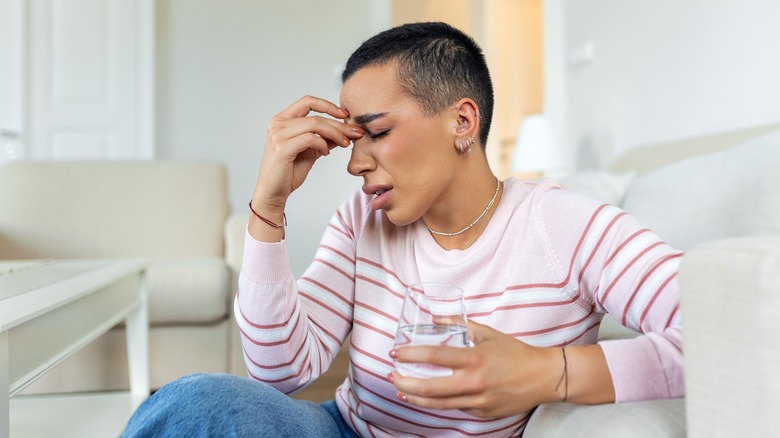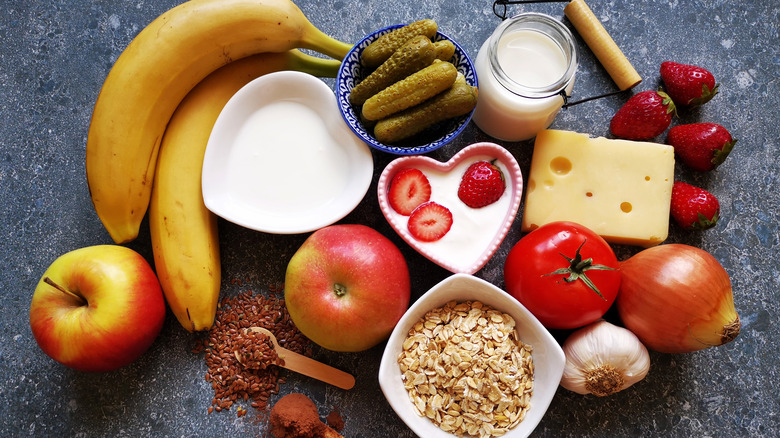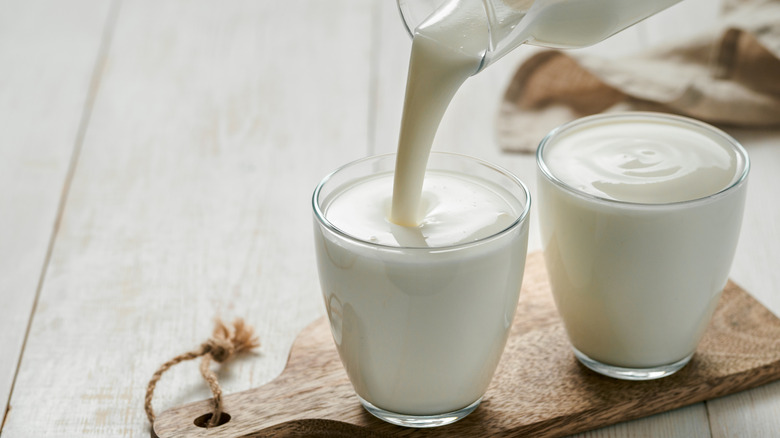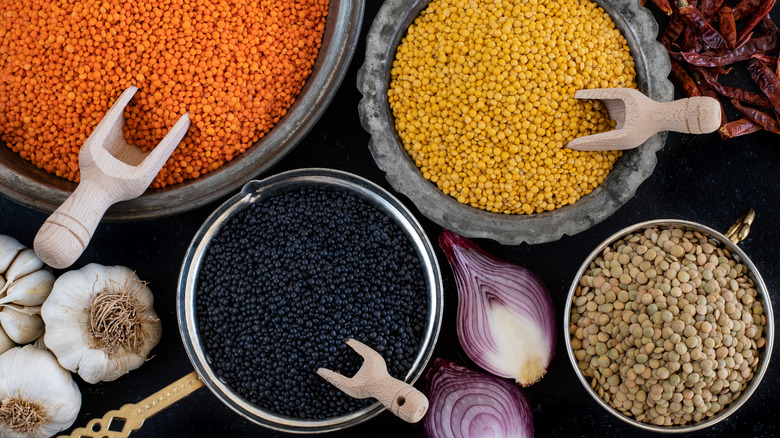Foods You Should Limit If You Have Sinusitis
Sinusitis is a condition that affects the sinuses, which are the cavities in the bones around the nose. The sinuses are lined with a thin layer of mucus, and when this lining becomes inflamed, it can cause a build-up of mucus, leading to a blocked nose and difficulty breathing (via WebMD). Other symptoms of sinusitis include a runny nose, a feeling of pressure in the face, and pain in the sinuses.
There are many different things that can cause sinusitis. Allergies can trigger an inflammatory response, and viruses, bacteria, and fungi can also cause the condition. Colds and other illnesses are the most common cause of sinusitis. In some cases, structural abnormalities in the nose, such as a deviated septum, can also lead to sinusitis. If you have sinusitis, there are many things you can do to help yourself feel better, including watching what you eat. Certain foods can aggravate the symptoms of sinusitis, and it is important to be aware of these triggers so that you can avoid them. Here are some foods to avoid if you have sinusitis.
Foods High in Histamine
Histamine is produced by your body's white blood cells to assist in battling possible allergens in your body. Many foods contain histamine as well. If you have a histamine intolerance, eating foods high in histamine can lead to a buildup in your body and trigger symptoms such as a runny nose, congestion, and sinus pain (via Healthline). If you have sinusitis, eating these foods can trigger the same response.
Some foods that are high in histamine include certain vegetables and dried fruits like tomatoes, avocado, eggplant, raisins, and apricots. Fermented foods and beverages including sauerkraut, kimchi, yogurt, vinegar, kombucha, and alcohol, are also high in histamine. Other foods include processed meats like sausage and salami, aged cheeses, and chocolate. If you have sinusitis, you should avoid eating these foods while you're sick in order to avoid unpleasant symptoms. If you have or believe you have a histamine intolerance, a healthcare professional can provide you with a list of foods to avoid and help you create a healthy diet to meet your needs.
Dairy Products
Dairy products are one of the most common triggers for sinusitis. Dairy products contain a protein called casein, which can cause inflammation in the sinuses in some people (via ReNew Houston). A casein allergy can also cause similar symptoms to sinusitis. Many people believe that dairy can cause a buildup of mucus in the sinuses, although science on this is limited (via Healthline). However, if you feel like dairy causes symptoms like a stuffy nose, it's best to avoid it as much as you can, especially if you have sinusitis.
Dairy products to avoid when you have sinusitis include milk, cheese, butter, and ice cream. You should also avoid eating foods that contain dairy like pizza and macaroni and cheese. Dairy-free alternatives can be a great way to enjoy these foods without the negative effects of dairy. If you have a casein allergy, you will need to avoid all products that contain this protein, including some non-dairy items such as soy milk and certain types of bread. A healthcare professional can help you create a safe and healthy diet if you have a casein allergy.
Sugary Foods
Eating sugary foods can cause inflammation in the body, which can aggravate the symptoms of sinusitis. Sugar can also feed bacteria and viruses, which can prolong an infection. When you have sinusitis, it's important to limit your intake of sugary foods so that you can recover more quickly (via Livestrong). A diet high in sugary foods can also lead to weight gain, diabetes, and other health issues. The American Heart Association recommends that men consume no more than 36 grams of sugar per day while women consume no more than 25 grams.
Some examples of sugary foods to avoid include candy, cookies, cake, pies, fruit juice, sodas, and energy drinks. You should also limit your intake of sugary fruits like grapes, bananas, mangoes, and pineapples. It's best to eat these fruits in moderation or not at all when you have sinusitis. Instead, focus on eating plenty of vegetables and whole fruits like berries, apples, and citrus fruits. These fruits are lower in sugar and can help reduce inflammation in the body.
Foods High in Salicylates
Salicylates are a natural chemical found in many plants. They are healthy for you, but for some people, salicylates can cause an allergic reaction that leads to sinusitis symptoms like congestion, runny nose, and headaches (via Healthline). If you think you might be sensitive to salicylates, it's important to avoid foods that contain them. If you aren't sensitive to salicylates but have sinusitis, you'll still want to avoid these foods when you're sick in order to avoid unpleasant side effects.
Some examples of foods high in salicylates include dried fruits, tomatoes, peppers, honey, citrus fruits, mushrooms, almonds, and peanuts. They are also found in legumes like beans and lentils. You should also avoid drinking coffee and tea as these beverages can contain high levels of salicylates. If you're unsure whether a food contains salicylates, you can check the label or ask a healthcare professional for their advice.
How to treat and prevent sinusitis
There are several things you can do to treat and prevent sinusitis. If you have an infection, your doctor may prescribe antibiotics. You can also take over-the-counter medications like ibuprofen to reduce pain and inflammation (via Mayo Clinic). To help relieve congestion, you can use a humidifier or take a hot shower. It's also important to drink plenty of fluids and get rest in order to let your body heal. You may want to take things easy and avoid strenuous activity, especially if it flares up your symptoms.
There are several things you can do to prevent sinusitis. These include washing your hands frequently, avoiding close contact with people who are sick, not smoking, and using a humidifier in your home. You should also avoid exposure to environmental irritants like dust, pollen, and smoke. If you have allergies, it's important to manage them effectively to reduce your risk of developing sinusitis. The bottom line is that sinusitis can be a pain, but there are ways to treat and prevent it. If you believe you have sinusitis, speak with your doctor about treating your symptoms.






